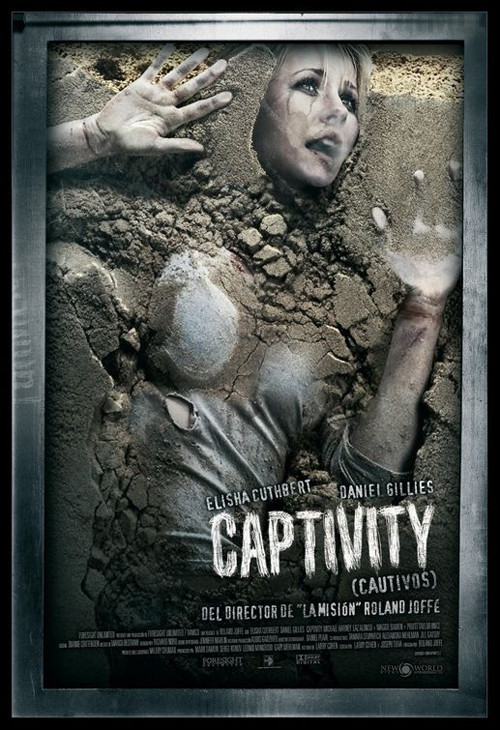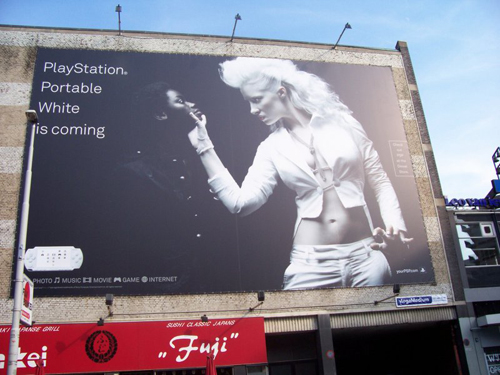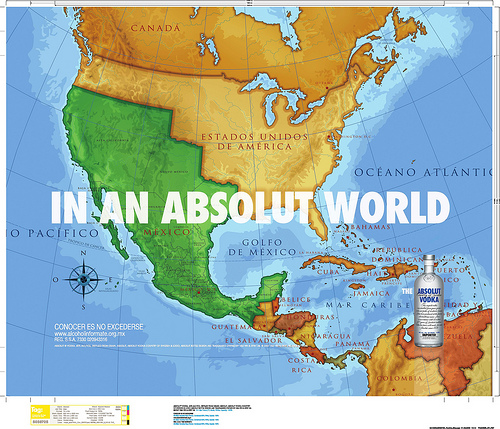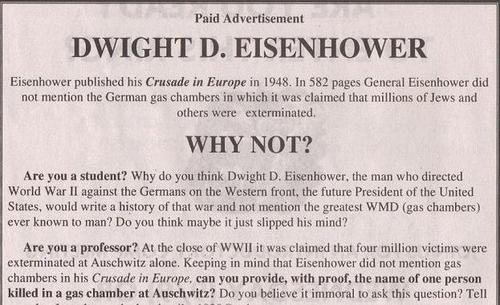
Ads are often meant to provoke the viewer (think baby-faced Brooke Shields with nothing between her and her Calvins) but sometimes viewers feel a little too provoked. Here is a list of fifteen controversial advertisements that were pulled due to negative reactions.
ICBC Anti-Drunk Driving Campaign

Back in May of 2010, the Insurance Corporation of British Columbia, Canada, Police Services and the Superintendent of Motor Vehicles launched an ad campaign comprised of three ads that compared getting caught driving under the influence to getting caught doing something else embarrassing. Like, for example, police catching you measuring your manhood. The campaign, which was aimed at men ages 19 to 25, sported a tagline that read, “Some things you don’t want to be caught doing.”
Sure, someone catching you measuring yourself is awkward, but a DUI? “Awkward” is an understatement, and was considered by some to be such a trivialization that the committee, at the behest of former solicitor-general Kash Heed, decided to pull the ad after only a few days because of the controversy that arose. Surveys had found that men in that age group feared getting caught drinking and driving more than they feared getting killed in an accident. “The strategy,” Nicolas Jimenez of ICBC told the Vancouver Sun, “was to build a campaign around situations you wouldn’t want to get caught in, then hit them with the message: Don’t get caught drinking and driving.” Seems logical but many of the law enforcement officials in British Columbia were “uncomfortable” with the themes. The government has promised that future public service advertisements against drunk driving will be more… palatable.
Rachel Ray for Dunkin’ Donuts
In 2008, Rachel Ray, queen of the quick and easy meal, fairly inoffensive person all things considered, shot what seemed like a pretty simple commercial for Dunkin’ Donuts coffee. But Dunkin’ Donuts yanked the ad suddenly after an outcry from some, namely conservative Fox News commentator Michelle Malkin, over what appears to be a paisley scarf Ray wears as she chats about coffee.
The scarf is actually what is known as a keffiyeh, which is traditionally worn as a headdress by Middle Eastern men and was widely worn by Palestinian nationalists during the Arab revolt of the 1930s. Many viewers, including Malkin, saw this as an egregious statement of support for jihadists. Dunkin Donuts issued a response stating, “In the ad that you reference, Rachael is wearing a black-and-white silk scarf with a paisley design that was purchased at a U.S. retail store. It was selected by the stylist for the advertising shoot. Absolutely no symbolism was intended. However, given the possibility of misperception, we will no longer use the commercial.” Melkin was pleased, but then promptly turned her to attention to the hoards of celebrity keffiyeh-wearers and the pseudo-hipster clothing purveyor Urban Outfitters.
Verizon Ad
Maybe 2008 was a bad year for advertising ideas. Just a few months after Ray’s controversial coffee outfit, Verizon found itself in some hot water over an advertisement for an LG Dare phone. The ad showed a man leaping over a fence to get his hands on a Dare –- only to be greeted by two chained, snarling pit bulls. Dog lovers were enraged by the depiction of the harsh treatment of the animals and reacted.
Paging People for the Ethical Treatment of Animals! The infamous animal rights group tried to get Verizon to pull the ad by outlining the reasons why it was offensive, but Verizon stayed firm. Finally, PETA released an action alert. When the company was inundated with 7,000 emails from incensed PETA supporters, they finally canceled the campaign.
Motrin
The pain reliever Motrin launched a slightly snarky ad campaign targeting moms who “wear” their babies (you know, in like, papooses, Baby Bjorns, or baby Snuggie things) during International Babywearing Week (yes, such a thing exists). The ad gave a nod toward the benefits of wearing your baby, including that it gives you maternal street cred, but it also pointed out that the act was tough on mommy’s muscles. Apparently this didn’t sit well with the baby-wearing moms (and some dads) of the world, many of whom took to twitter, their blogs and YouTube to inform the world they would never, ever use Motrin again.
After the parental blogosphere erupted, the drug manufacturer McNeil Consumer Healthcare, a division of Johnson and Johnson, pulled the ad and released a statement. “With regard to the recent Motrin advertisement, we have heard you . . . please accept our sincere apology,” said the company’s vice president of marketing Kathy Widmer. The moral of this story? Don’t piss off moms with computers.
Captivity Film

Don’t sweat it if you don’t remember the release of the 2007 film Captivity or even, dare I say it, the actress Elisha Cuthbert. The Saw rip-off barely made a splash in the film world but the original posters for the film, which depicted Cuthbert being abducted, confined, and tortured, were deemed by many to be unnecessarily gratuitous and condoning of violence towards women. Thirty billboards were erected in the Los Angeles area as well as 1,400 ads on top of New York taxicabs. The studios producing the project, Lionsgate and After Dark Films, claimed that the ad campaign was launched by accident.
“To be honest with you, I don’t know where the confusion happened and who’s responsible,” Courtney Solomon of After Dark Films stated. All the advertisements were removed within a week and replaced with a tamer version of Ms. Cuthbert submerged in sand. Smells like an ill-conceived shock-marketing campaign… that clearly didn’t pan out.
Burger King’s “Texican”-Style Whopper
Back in 2009, ad execs for Burger King had to develop a campaign to promote the fast food conglomerate’s new Texican-style burger — a spicy version of the beloved Whopper. So naturally, these creatives came up with idea of having a tall, gangly Texan cowboy move in with a Mexican dwarf wrestler, and thus was born the commercial that many Mexican nationalists called “a whopper of an insult.”
Even bigwigs weighed in on the controversy, what with Mexico’s ambassador to Spain writing a letter of objection to the company and stating publicly that the ad “improperly used the stereotyped image of Mexicans.” People were also outraged that the teeny Mexican’s cape resembled the flag of their nation, which they consider a symbol of national pride and something to be treated with the utmost respect. This wasn’t the first time the nation felt belittled by a fast food chain’s ad campaign: Mexicans were also angered by the use of that funny little Chihuahua who acted as Taco Bell’s spokes dog in the 1990s.
KFC’S Health Ads

Chicken mavens Kentucky Fried Chicken released a series of ads in 2003 touting the health benefits of items on their menu. The ads, sporting the befuddling tagline, “You’ve got what KFC’s Cooking!”, pitted the nutrition of one of their lowest calorie options, “Original Recipe” fried chicken breasts, against the stats of a Burger King Whopper. Some knowledgeable people, including the head of the Center for Public Science, found these claims “deceptive,” and stated that even though the fat and carbohydrate content cited by KFC was approximately correct, they neglected to mention the high sodium content of the food. A review columnist for Ad Age called the campaign “desperate and sleazy.”
The company held fast at first, claiming that they were just trying to “educate” the public as to how you could include fried chicken in your healthy diet (?!) but eventually relented to growing pressure and ordered their national and local franchises to pull the ad, citing reasons of “brand protection.”
KFC Australia

Poor KFC just can’t catch a break — or maybe just write an inoffensive advertisement. Kentucky Fried Chicken released an ad in Australia that featured a white man surrounded by a black crowd at a cricket match. “Need a tip when you’re stuck in an awkward situation?” says the befuddled white guy before having a fried chicken-related epiphany and sharing his bucket with his fellow cricket fans. The message struck many viewers as racist and the ad was yanked shortly thereafter.
KFC, though, owned by Yum! Brands, which was named one of the “40 Best Companies for Diversity” in Black Enterprise Magazine for the fifth year in a row in 2009, was ever so slightly defensive about their “Cricket Survival” campaign. The company claimed that the tone of the ad was “tongue-in-cheek” and that most of the protest was heard in the United States, where the ad was never supposed to run.
Even the New York Daily News , obviously based in the States, took a poll in which 65% of respondents said they thought the ad was “just lighthearted and fun.” Some people are just so sensitive.
Miami Anti-Islam Bus Ads

Pre-Ground-Zero-Mosque controversy, Robert Spencer of the Stop Islamization of America Group purchased ads on the sides of public buses in the county of Miami-Dade in Florida. “Is your family or community threatening you?” the ad read before offering a link to Refuge From Islam, a website listing resources for people considering leaving Islam. Spencer publicly stated, “We wanted to show that some people will stand up against violent intimidation, some people will stand up for religious freedom in America.” Funny considering many of the “resources” listed at Refuge from Islam are Christian.
Just two days after the ads went up, however, The Miami Herald reported that Miami-Dade Transit decided to pull them because they were potentially offensive to Muslims. Spencer and SIOA fired back, citing the allowance of an ad for GainPeace.com, a service that provides information about Islam, and also this tiny little thing called the Constitution. They were set to go to court when Miami-Dade backed down. Similar campaigns have been launched in other U.S. cities –- to similar outcry.
Sony PSP White

Fresh from another controversial campaign featuring religious imagery, Sony PSP decided to invoke provocative imagery of another kind. Billboards in the Netherlands announced the coming of their latest model, the PSP White, with the “racially charged” image of a model with the complexion of snow grasping the jaw of a young black woman. People reacted immediately and internationally: California Assemblyman Leland Yee and NAACP members in the videogame capital of San Jose/Silicon Valley called for an immediate discontinuation of the campaign.
At first Sony came to the ads defense claiming no racial subtext, but eventually pulled the ads and released this apology-esque statement: “We recognize that the subject matter of one specific image may have caused concern in some countries not directly affected by the advertising. As a result, we have now withdrawn the campaign.”
Absolut’s Mexico Ads

Perhaps as retaliation for the Burger King Ads, Absolut Vodka released a campaign in 2008 that showed a revamped map of the United States. The map was of the territory before the Mexican-American war of 1848 when California was known as “Alta California” and was part of Mexico. Absolut, a Swedish company, said that the ad was relevant to Mexicans, some of whom still resent the loss of California, and would tap into their national pride. The line beneath the map read, “In an Absolut World,” implying that more Mexico and less America would make a happier world.
This is all well and good, but Absolut should never have underestimated the power of the American consumer. People North of the border were enraged, and Absolut felt their heat. Absolut apologized profusely and said that even though the ad was only shown in Mexico, they understood that it was insensitive to its neighbor. They also pulled the ad.
Committee for Open Debate on the Holocaust

You’d think Harvard students would be smart enough to avoid denying the Holocaust, but apparently not. Not only do they deny it, but every so often, they advertise their denial! The undergraduate paper Harvard Crimson ran an advertisement for Bradley Smith on behalf of the Committee for Open Debate on the Holocaust that asked students to provide “with proof, the name of one person who was killed in the gas chamber at Auschwitz.” The ad was up for a measly one day before the paper pulled it and offered their apologies, claiming a lapse in communication due to school vacation was the reason for the error.
Anti-Obesity Ad

In the liberal enclave of the Bay Area of Northern California, an advertising company called Kaiser Permanente launched a campaign to target childhood obesity. They decided their campaign would hinge on the word “beat” — as in “beat obesity.” To that end, they designed a billboard emblazoned with the slogan “Beat Obesity with a Stick” against a background of celery sticks.
Size-acceptance groups (and not, surprisingly, domestic violence or child abuse victims) were enraged by the ad, saying that they had often been the target of bullying, physical and verbal, as a result of their size. The ad, they said, was therefore offensive and ought to be pulled. (Trying so hard not to make a joke about “throwing one’s weight” into a movement right now). They won in the end, with Kaiser assuring the PR director of the National Association to Advance Fat Acceptance that the ads would be discontinued.
Visit Denmark

In an effort to attract more tourists, the tiny Baltic nation of Denmark decided to launch a viral marketing campaign to highlight their national treasures – this means, of course, their tall, easy Nordic women. The ad shows a blond woman holding a baby and telling the camera that the father of the baby was a tourist whose name she couldn’t recall. Many people (mostly men) were tickled by the advertisement, but many were not. Danish Sociologist Karen Sjoerup said the ad implied, “you could lure fast, blond Danish women home without a condom.” The video was pulled –– but not after it received over 800,000 hits on YouTube.
Daisy

And last but certainly not least, perhaps the most famous pulled advertisement of all time: the one in which the cute little girl playing with a flower gets BLOWN UP! The advertisement shows a little girl plucking petals off a flower and counting as she does, but soon her voice is drowned out by a louder, more robotic, masculine one counting down from ten. The camera zooms in on her face before an atomic bomb explodes, and presumably, adorable little girl and flower are decimated.
The ad, which was for the presidential campaign of Lyndon Johnson, ran only once, on September 7th of 1964 during an NBC Monday Night movie. Despite its lack of air time, it made an enormous social impact. It contributed to the landslide victory of Johnson over Barry Goldwater and remains an iconic American image today.